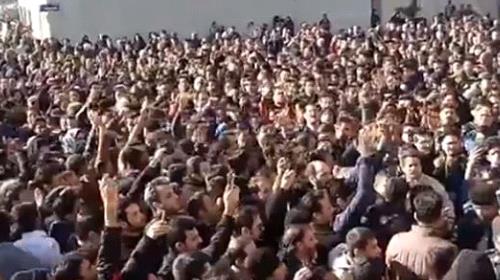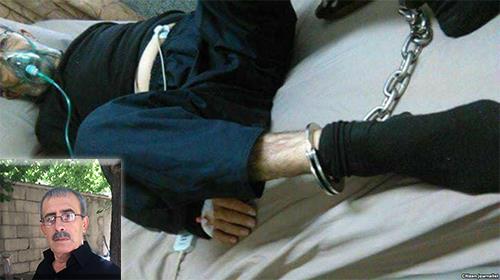On Iran’s protests, Europe must find its voice
Social and Economical protests have turned political
As protests recently began to consume Iran, European capitals were at a seeming loss for words. After several days of silence, Europe’s leaders issued curt statements of sympathy for the protestors — but with a notable tinge of moral equivocation. A European Union statement and Britain’s foreign secretary separately called on “all concerned to refrain from violence.” Germany’s foreign minister urged “all sides” to abstain from bloodshed. What accounts for Europe’s apparent conflation of victim and oppressor?
Previously, European leaders have expressed their determination to raise difficult issues with Iran, including human rights. After concluding the 2015 nuclear deal, formally known as the Joint Comprehensive Plan of Action (JCPOA), European leaders hailed the beginning of a new era in EU-Iran relations. A 2016 resolution passed by the European Parliament voiced the hope that a “substantial improvement in EU-Iran relations” would spur a “comprehensive” dialogue that is “critical, open and frank in areas where Iran and the EU disagree.”
In this context, European leaders said, Tehran’s domestic repression would constitute a firm priority. “We agreed to have a very frank and open dialogue on human rights,” said EU foreign policy chief Federica Mogherini during an April 2016 visit to Iran. “This is no secret that we have some concerns in this respect.” Europe, she added, is “always firm on principles and our approach to human rights is based on probably the highest standards in the world, even compared to some of our strongest partners. And we will never compromise on that.”
Time still remains — but not much — for European leaders to find their voice and demonstrate commitment to these values. What seems to constrain them, at least in part, is the difficulty of recognizing that a key premise of their diplomacy with Tehran has proven flawed.
To reconcile a concern for human rights with a policy of engaging the Iranian regime as presently constituted, European leaders vested considerable hope in Iranian leaders they regarded as moderates, particularly President Hassan Rouhani . The multi-million dollar trade memoranda signed during his visits to European capitals aimed not only to improve Iran’s economy, but also to empower Rouhani himself, thereby giving him political leverage to seek meaningful reforms of the ruling theocracy.
This approach has failed. In fact, Europe has fundamentally misjudged the political objectives of Rouhani, who seeks not to reform Iran, but to advance the Islamist agenda of its ultimate decision-maker, Supreme Leader Ayatollah Ali Khamenei.
Though the Iranian president has frequently pledged to improve human rights, his four-and-a- half-year record in office tells a different story. During his first term, Rouhani presided over more than 3,000 executions. (By contrast, his predecessor, Mahmoud Ahmadinejad , executed at least 1,095 people during his first term and at least 2,322 during his second.) Journalists and political activists languished in prison. Women, homosexuals, and ethnic and religious minorities suffered routine persecution. Iran’s theocratic judiciary went unreformed. Meanwhile, Tehran spent billions on its military exploits in Syria, Iraq, Lebanon, and Yemen. In October 2017, Asma Jahangir, the UN special rapporteur for human rights in Iran, said Rouhani has yet “to walk the talk.”
This grim resume accounts in large measure for the ferocity of the protests now inflaming the country. Rouhani, after all, campaigned for reelection last year by repeating the pledges for reform of his first campaign. This time around, he even released a “Charter on Citizens’ Rights,” including freedom of speech, religion, assembly, and due process, that he intended to implement as president. More than seven months after his decisive victory, he has yet to do so.
The chants of “Death to Rouhani!” during the latest protests suggest that Iran’s people — unlike European diplomats — grasp that the Iranian president offers only false promises of reform. But rather than reassess their assumptions, European leaders continue to proceed as if they can advance the cause of human rights by preserving the cordial relationship they have enjoyed with Rouhani’s government thus far. At the same time, despite Iran’s deteriorating record, they have failed to expand human rights sanctions on Iran, apparently hopeful that their present diplomacy will eventually prove sufficient to effect change.
This strategy not only will fail to moderate the regime, but also unwittingly betrays Europe’s pledge to abjure any compromises on core human rights principles. Rather than continue to equivocate about Tehran’s true nature, Europe should recall its prior commitments — and advance a dialogue that is genuinely critical, open and frank.
Previously, European leaders have expressed their determination to raise difficult issues with Iran, including human rights. After concluding the 2015 nuclear deal, formally known as the Joint Comprehensive Plan of Action (JCPOA), European leaders hailed the beginning of a new era in EU-Iran relations. A 2016 resolution passed by the European Parliament voiced the hope that a “substantial improvement in EU-Iran relations” would spur a “comprehensive” dialogue that is “critical, open and frank in areas where Iran and the EU disagree.”
In this context, European leaders said, Tehran’s domestic repression would constitute a firm priority. “We agreed to have a very frank and open dialogue on human rights,” said EU foreign policy chief Federica Mogherini during an April 2016 visit to Iran. “This is no secret that we have some concerns in this respect.” Europe, she added, is “always firm on principles and our approach to human rights is based on probably the highest standards in the world, even compared to some of our strongest partners. And we will never compromise on that.”
Time still remains — but not much — for European leaders to find their voice and demonstrate commitment to these values. What seems to constrain them, at least in part, is the difficulty of recognizing that a key premise of their diplomacy with Tehran has proven flawed.
To reconcile a concern for human rights with a policy of engaging the Iranian regime as presently constituted, European leaders vested considerable hope in Iranian leaders they regarded as moderates, particularly President Hassan Rouhani . The multi-million dollar trade memoranda signed during his visits to European capitals aimed not only to improve Iran’s economy, but also to empower Rouhani himself, thereby giving him political leverage to seek meaningful reforms of the ruling theocracy.
This approach has failed. In fact, Europe has fundamentally misjudged the political objectives of Rouhani, who seeks not to reform Iran, but to advance the Islamist agenda of its ultimate decision-maker, Supreme Leader Ayatollah Ali Khamenei.
Though the Iranian president has frequently pledged to improve human rights, his four-and-a- half-year record in office tells a different story. During his first term, Rouhani presided over more than 3,000 executions. (By contrast, his predecessor, Mahmoud Ahmadinejad , executed at least 1,095 people during his first term and at least 2,322 during his second.) Journalists and political activists languished in prison. Women, homosexuals, and ethnic and religious minorities suffered routine persecution. Iran’s theocratic judiciary went unreformed. Meanwhile, Tehran spent billions on its military exploits in Syria, Iraq, Lebanon, and Yemen. In October 2017, Asma Jahangir, the UN special rapporteur for human rights in Iran, said Rouhani has yet “to walk the talk.”
This grim resume accounts in large measure for the ferocity of the protests now inflaming the country. Rouhani, after all, campaigned for reelection last year by repeating the pledges for reform of his first campaign. This time around, he even released a “Charter on Citizens’ Rights,” including freedom of speech, religion, assembly, and due process, that he intended to implement as president. More than seven months after his decisive victory, he has yet to do so.
The chants of “Death to Rouhani!” during the latest protests suggest that Iran’s people — unlike European diplomats — grasp that the Iranian president offers only false promises of reform. But rather than reassess their assumptions, European leaders continue to proceed as if they can advance the cause of human rights by preserving the cordial relationship they have enjoyed with Rouhani’s government thus far. At the same time, despite Iran’s deteriorating record, they have failed to expand human rights sanctions on Iran, apparently hopeful that their present diplomacy will eventually prove sufficient to effect change.
This strategy not only will fail to moderate the regime, but also unwittingly betrays Europe’s pledge to abjure any compromises on core human rights principles. Rather than continue to equivocate about Tehran’s true nature, Europe should recall its prior commitments — and advance a dialogue that is genuinely critical, open and frank.
Tzvi Kahn is a senior Iran analyst at the Foundation for Defense of Democracies, a Washington-based nonpartisan research institute focusing on national security and foreign policy.




Comments
Post a Comment